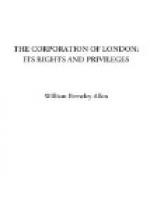The New Wards.
The first clause of the proposed Bill directs a new division of the City, and recommends that it be redistributed into sixteen wards, instead of twenty-five as heretofore. No reason is assigned for this innovation, beyond an allusion to the fact that no other city—not even Liverpool—possesses more than that number of divisions or departments. The object of the Government was evidently to abase and humiliate the City of London, and to reduce it to the level of the provincial municipalities. It is alleged, that while the metropolis has extended far and wide in every direction, the boundaries of the City have remained unchanged, so that they now inclose barely 1/108th part of the entire metropolitan area. The population also does not embrace 1/20th part of the inhabitants of the aggregate of villages and boroughs collectively known as London. An undue importance, therefore, has been ascribed to that small portion which constitutes the City proper, to the prejudice of the more populous districts, which inclose it on every side. This overrated influence is now to be diminished in good earnest, and henceforth the sole criterion of importance is to be the number of men, women, and children existing within a certain area. Intelligence, wealth, enterprise, industry, commercial reputation, and ancient rights are to be regarded as of little value when compared with the register of births and marriages. So, the City of London is to be divided into sixteen wards, that it may learn not to lift up its head above other corporations. The division is, of course, to be effected by the inevitable barrister of seven years’ standing—the modern type of all that is wise, good, intelligent, and incorruptible. It matters not that these gentlemen may and must be totally unacquainted with local peculiarities and requirements. There may be ward charities, and ward bequests, which will create confusion and perplexity under any new arrangement. The inhabitants, too, of one ward may have strong personal objections to be transferred to another. They may dislike the disrupture of old family ties and connections, and cling fondly to the traditions and associations of their youth. Such considerations as these, however, have no weight with red-tapists, who believe in the infallibility of precedents, and apply one measure and one standard to all things.
The only plausible objection that can be urged against the existing distribution of the wards is their inequality as to extent and population; but even if like portions of territory were set apart for each ward, the number of the inhabitants and their influence will vary according to circumstances far beyond the control of any barrister, be he of twice seven years’ standing. Besides, though unequal as to area and inmates, the wards are fairly enough represented; for, while the Lime Street Ward returns only four members to the Common Council, Bishopsgate sends fourteen, and Farringdon




